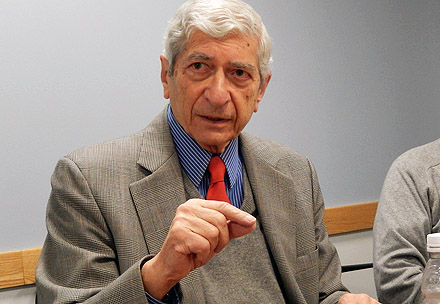Event
Marvin Kalb warns against military strategy that inconsistently seeks approval of Congress

November 12, 2013 – The founding director of the Shorenstein Center and Edward R. Murrow Professor of Press and Public Policy at Harvard Kennedy School, Marvin Kalb spoke to the Shorenstein Center about the war powers of U.S. presidents and how the lack of congressional support has impacted military policy.
Drawing on the example of Vietnam, Kalb argued that “the word ‘commitment,’ when uttered by a president of the United States, almost becomes policy.” President Truman’s attitude toward Vietnam “changed dramatically” during his term, said Kalb. At first he didn’t see Vietnam as a threat, but by the end of his presidency, Vietnam was “within the national security interests of the United States.” Regarding Korea, Truman, who years before said that “if he ever had to send American troops anywhere in the world, it would only be with the approval of the U.S. Congress,” bypassed Congress and instead sought approval from the U.N. for war with Korea. The threat of communism advancing into the free world was such a direct threat, Kalb pointed out, that action was needed immediately.
This pattern of keeping Congress out of the approval process on military action continued through the presidencies of Eisenhower, Kennedy, Johnson and Nixon, up to present day, Kalb said. But the pattern was disrupted with the recent development in Syria, he said, when after making statements about a U.S. strike, Obama instead went to Congress to seek approval.
Kalb acknowledged that although the president has authority as Commander-in-Chief to send troops into battle, “there ought to be a question as to the use of that authority, and there ought to be a balance of some sort.” As for the president seeking the approval of Congress for future military action, Kalb predicted that the “odds are now that he will need Congress [approval] before he takes any action.” However, he warned, “it ought to be clear when a great power such as the U.S. feels it must use its military strength against an adversary, that we ought to know what the system is and how it’s going to work – and we don’t.”
Article and photo by Janell Sims, Shorenstein Center.